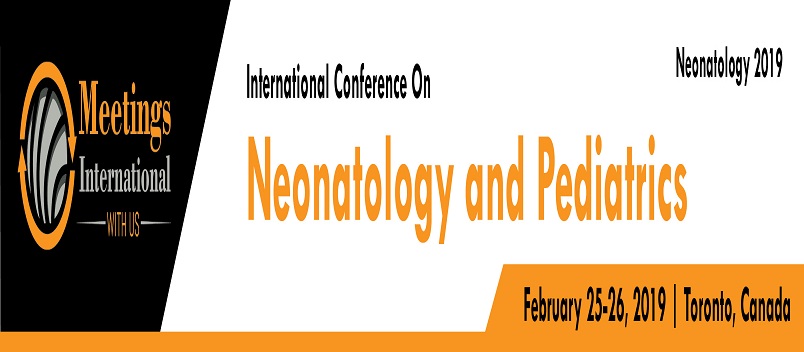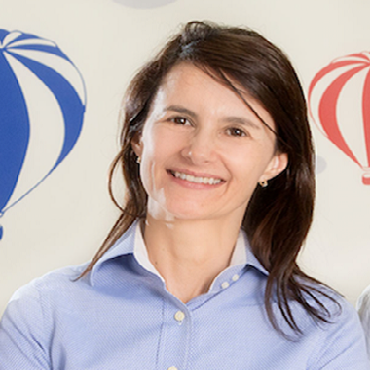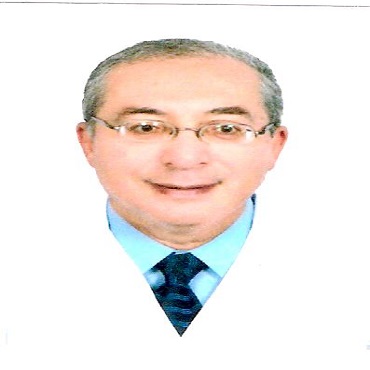
Neonatology 2018

Theme: Ethical Aspects of Neonatal Care and Interventions to Improve Neonatal Health
International Conference on Neonatology and Pediatrics has been rescheduled to February 25th and 26th, 2019 to Toronto, Canada. Neonatology 2019 will bring together renowned scientists, researchers, doctors, talented students under one roof to express their ideas and gain knowledge in the field of Neonatology and Pediatrics. The conference will focus on the theme “Ethical Aspects of Neonatal Care and Interventions to Improve Neonatal Health”. Neonatology and Pediatrics 2019 will focus on the latest provoking topics and research in the field of Neonatology. It will throw light on wide range of topics that include Perinatology, Neonatal care, Pediatric infections, Neonatal complications, Pediatric and neonatal nutrition, Developmental disorders, Psychosocial aspects of Pediatrics, Child psychiatry and behavioural problems, Adolescent problems. Neonatology 2018 provides a platform to all experts to put forth their research studies and experiments before a large number of individuals who have a keen interest in the field of Neonatology. The series of talks, poster presentations, workshops, discussions will keep participants hooked to the event and increase their interest in learning at Neonatology 2019.
Session 1: Neonatology
Neonatology is a branch that is involved in the care, development and the diseases of the new-born babies. The primary patients of neonatologists are the new born babies who are sick or require care due to low birth weight and other problems. More than 40% of deaths in children occur in their neonatal state that is in the first month of their life. Classification of a child's life into well-defined periods has become an important standardization to determine the care and interventions necessary to increase the chances of child survival. Immunization of pregnant women has proven beneficial to both mother and infant by decreasing morbidity and mortality.
Neonatology Conference | Pediatric Conference | Neonatology Workshop | Neonatology Meetings | Pediatric Forum | Pediatric Symposium | Pediatric Medicine Congress | Medicine Conference | Neonatology Event | Neonatal Conference | Perinatology Workshop
Session 2: Pediatrics
Pediatrics focuses on the well-being of children from conception through adolescence. Pediatricians are doctors who manage the health of a child, including physical behaviour and mental health issues. They diagnose and treat childhood illnesses, from minor health problems to serious issues. Post-marketing safety reviews are particularly important for pediatrics. Drug use in the pediatric population is continuously rising due to improved diagnostics and therapies. The number of births in the United States increased by 1% between 2013 and 2014, to a total of 3,988,076.
Neonatology Conference | Pediatric Conference | Neonatology Workshop | Neonatology Meetings | Pediatric Forum | Pediatric Symposium | Pediatric Medicine Congress | Medicine Conference | Neonatology Event | Neonatal Conference | Perinatology Workshop
Session 3: Neonatal Care
The first 28 days of life are said to be neonatal. Neonatal care is the care given to infants (new-born babies) from the time of their delivery through about the neonatal stage of their life. Deaths among the children are more and more concentrated in the first days of life. This leads to focus on infants care even more. In 2016, an estimated 2.6 million children died in their first month of life, which means that approximately 7,000 infants died every day. Most of these infants died in their first week of life in which approximately one million died in their first day and another one million died in the following six days. But, major progress has been made in improving neonatal survival. Neonatal mortality has declined all around the world as the world’s neonatal mortality rate has fallen from 37 deaths per 1,000 live births in 1990 to 19 per 1,000 live births in 2016. The result is a drop in neonatal deaths worldwide from 5.1 million in 1990 to 2.6 million in 2016.
Neonatology Conference | Pediatric Conference | Neonatology Workshop | Neonatology Meetings | Pediatric Forum | Pediatric Symposium | Pediatric Medicine Congress | Medicine Conference | Neonatology Event | Neonatal Conference | Perinatology Workshop
Session 4: Pediatric and Neonatal Nutrition
Neonatal nutrition has an important role to play in normal child development and is necessary for sick or premature infants. Goals for nutrition support in infants include obtaining body composition similar to age-matched children and maximizing long-term growth and neurodevelopment. The World Health Organization (WHO), the American Academy of Pediatrics (AAP) and Institute of Medicine recommended the exclusive use of human milk for healthy term infants for the first six months of life, and continued breastfeeding for at least 12 months. The public health goal for healthy people 2020 is for 82% of the mothers to initiate breastfeeding.
Neonatology Conference | Pediatric Conference | Neonatology Workshop | Neonatology Meetings | Pediatric Forum | Pediatric Symposium | Pediatric Medicine Congress | Medicine Conference | Neonatology Event | Neonatal Conference | Perinatology Workshop
Session 5: Developmental Disorders
Around 10% children are said to suffer from developmental disorder. Whether a child has a developmental delay or disorder, early identification and treatment are essential for achieving the best possible outcome. In a study conducted by Centre for Disease Control and Prevention (CDC) among 120,000 children, it was found that developmental disabilities are common (about 1 in 6 children) and the number of such children increased to about 17.1% over the last 12 years.
Neonatology Conference | Pediatric Conference | Neonatology Workshop | Neonatology Meetings | Pediatric Forum | Pediatric Symposium | Pediatric Medicine Congress | Medicine Conference | Neonatology Event | Neonatal Conference | Perinatology Workshop
Session 6: Pediatric Infections
Infants can acquire some infections that can deteriorate their health and can lead to many problems. New born babies sometimes develop infections caused by a wide range of viral, bacterial, fungal, and parasitic infectious agents. The probability of dying among children aged 5–14 was 7.5 deaths per 1,000 children aged 5 in 2016 – substantially lower than the probability of dying among children under age 5 (41 deaths per 1,000 live births).
Neonatology Conference | Pediatric Conference | Neonatology Workshop | Neonatology Meetings | Pediatric Forum | Pediatric Symposium | Pediatric Medicine Congress | Medicine Conference | Neonatology Event | Neonatal Conference | Perinatology Workshop
Session 7: Adolescent Problems
Adolescence is the phase between 10 to 20 years in which children undergo rapid changes in body size, physiology, psychological and social functioning. This is the period when individuals attain full maturity. Worldwide 10-20% of children and adolescents experience mental disorder. About 1.3 million adolescents died from preventable or treatable causes during 2012 as per WHO reports. Injuries and neuropsychiatric disorders were the major issues in adolescents. There is an increasing trend in adolescent obesity due to great shift in diet and activity pattern. Nearly 35% of the global burden of disease has roots in adolescence. Half of all mental health disorders in adulthood start by 14 years of age.
Neonatology Conference | Pediatric Conference | Neonatology Workshop | Neonatology Meetings | Pediatric Forum | Pediatric Symposium | Pediatric Medicine Congress | Medicine Conference | Neonatology Event | Neonatal Conference | Perinatology Workshop
Session 8: Pediatric Cardiology
Pediatric cardiology is concerned with diseases of the heart of growing and developing individual. The doctors who diagnose and treat children with heart problems are known as pediatric cardiologists. Congenital heart defects affects nearly 1% or nearly about 40,000 births per year in the United States. About 25% babies with a congenital heart defect have a critical heart defect and those infants generally need surgery or other procedures in the first year of their life. In a study of neonatal deaths, it was found that 4.2% of all neonatal deaths were due to a congenital heart defect.
Neonatology Conference | Pediatric Conference | Neonatology Workshop | Neonatology Meetings | Pediatric Forum | Pediatric Symposium | Pediatric Medicine Congress | Medicine Conference | Neonatology Event | Neonatal Conference | Perinatology Workshop
Session 9: Neonatal Respiratory Disorders
Neonatal respiratory distress syndrome (RDS) is a condition generally seen in premature infants. The condition makes it hard for the baby to breathe. It generally occurs in infants whose lungs are not fully developed. The more premature the baby is, the higher is the chance of RDS after birth. In 2003, the total number of live births in the United States for all races was 4,089,950; about 0.6% of new-borns had RDS. In 2005, there were 4,138,000 live births in the United States, and comparatively more number of babies were affected with RDS because the rate of premature births had increased from 11.6% to 12.7%.
Neonatology Conference | Pediatric Conference | Neonatology Workshop | Neonatology Meetings | Pediatric Forum | Pediatric Symposium | Pediatric Medicine Congress | Medicine Conference | Neonatology Event | Neonatal Conference | Perinatology Workshop
Session 10: Genetics and Pediatric Practice
The individuals or families can be informed about the present and future possible genetic disorders and the various options available for prevention from such a disorder and minimising its adverse effects. Family health history collection and genetic testing are the main elements for the successful translation of genomics into primary care practice. As the majority of genetic disorders are diagnosed at birth or during the first years of life, including genetics has become an important element of pediatric education.
Neonatology Conference | Pediatric Conference | Neonatology Workshop | Neonatology Meetings | Pediatric Forum | Pediatric Symposium | Pediatric Medicine Congress | Medicine Conference | Neonatology Event | Neonatal Conference | Perinatology Workshop
Session 11: Neonatal Intensive Care Unit (NICU)
New born babies who need intensive medical care are generally admitted to neonatal intensive care unit (NICU). It has advanced technology and trained health care professionals to provide required special care for the infants. No woman wants her baby to die in the NICU, but every year 10-15% of babies born in the United States die due to reasons including prematurity, heart problems, birth defects, breathing irregularities and infections.
Neonatology Conference | Pediatric Conference | Neonatology Workshop | Neonatology Meetings | Pediatric Forum | Pediatric Symposium | Pediatric Medicine Congress | Medicine Conference | Neonatology Event | Neonatal Conference | Perinatology Workshop
Session 12: Psychosocial Aspects of Pediatrics
The optimal care of children with surgical diseases requires acquiring skills in the psychosocial assessment and therapy of children. Developing and implementing a curriculum to teach these concepts to pediatric surgery trainees should result in decreased perioperative stress for the child and improved patient outcomes and family satisfaction. Mental and physical health has a great impact on one another. Increased physical symptoms can have a negative effect on the child's mental health. Physical illnesses can affect the child’s happiness and how they feel about themselves. When children are distressed and sad then it becomes harder to control their illness.
Neonatology Conference | Pediatric Conference | Neonatology Workshop | Neonatology Meetings | Pediatric Forum | Pediatric Symposium | Pediatric Medicine Congress | Medicine Conference | Neonatology Event | Neonatal Conference | Perinatology Workshop
Pediatrics & Neonatology is a branch dealing with all clinical care of infants and children. Infants and kids are different from adults in respect to the general physiology of having a smaller and growing body. Congenital defects and genetic variance are of great concern to pediatricians and neonatologists than to an adult physician. Issues revolving around infectious diseases and immunizations are also dealt with by pediatricians.
There has been an increase in the number of non-physician pediatric clinicians in recent years and an expansion in their respective scopes of practice. This raises critical public policy and child health advocacy concerns. Pediatric practice encompasses the care of patients from birth through adolescence. One way to define the scope of pediatric practice is to look at the risks to health and development that affect children and adolescents. Health supervision and attention to both acute and chronic illness should be provided to all children as they mature.
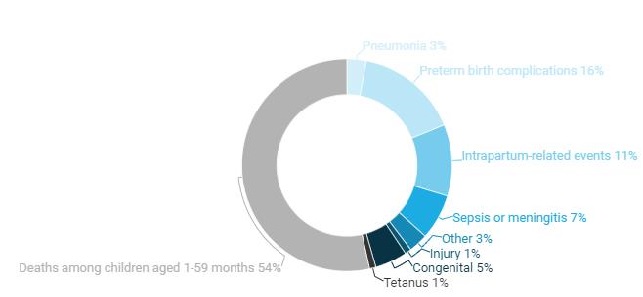
In 2016, an estimated 2.6 million children died in their first month of life, which means that approximately 7,000 infants died every day. Most of these infants died in their first week of life in which approximately one million died in their first day and another one million died in the following six days. But, major progress has been made in improving neonatal survival. Neonatal mortality has declined all around the world as the world’s neonatal mortality rate has fallen from 37 deaths per 1,000 live births in 1990 to 19 per 1,000 live births in 2016. The result is a drop in neonatal deaths worldwide from 5.1 million in 1990 to 2.6 million in 2016.
The infant mortality rate is higher in the United States than in many other developed countries. In the post-neonatal period (28 days to 11 months), the mortality rate has also declined. Much of the mortality in this age group reflects the postponement of death from neonatal conditions. Although sudden infant death syndrome (SIDS) is a significant cause of death in this age group, the rate of SIDS deaths has fallen since 1992, when the American Academy of Pediatrics recommended putting infants to sleep on their backs or sides. In 2016, 4.2 million (75% of all under-five deaths) occurred within the first year of life. The risk of a child dying before completing the first year of age was highest in the WHO African Region (52 per 1000 live births), over six times higher than that in the WHO European Region (8 per 1000 live births).

Globally, the infant mortality rate has decreased from an estimated rate of 64.8 deaths per 1000 live births in 1990 to 30.5 deaths per 1000 live births in 2016. Annual infant deaths have declined from 8.8 million in 1990 to 4.2 million in 2016.
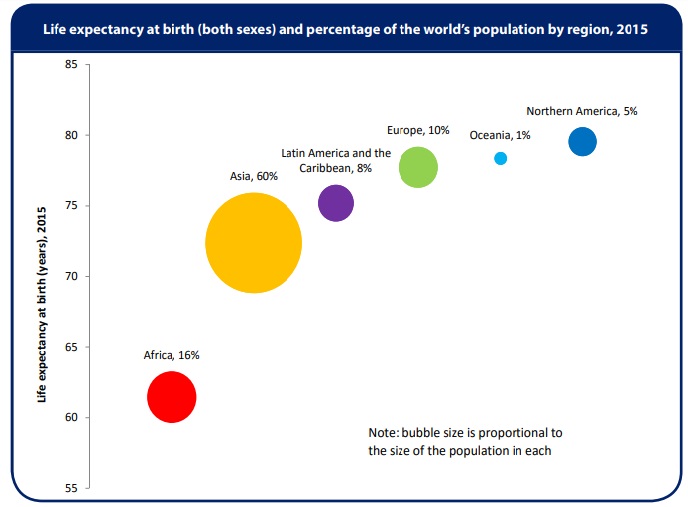
In 2015, the average life expectancy at birth for Africa, where 16 per cent of the world’s population lived, was 61 years; and the average life expectancies for the other five regions, where 84 per cent of world’s population lived, varied between 70 and 80 years. Across regions, the highest life expectancy at birth was 80 years in Northern America, where 5 per cent of the world’s population lived, followed by Europe and Oceania with 78 years and 11 per cent of the world’s population, Latin America and the Caribbean with 75 years and 8 per cent of the world’s population, and Asia with 72 years and 60 per cent of the world’s population.
Major hospitals associated with neonatology and pediatrics-
- Boston Children’s Hospital
- Cincinnati Children’s Hospital Medical Centre
- Children’s Hospital of Philadelphia
- Texas Children’s Hospital, Houston
- Children’s National Medical Centre, Washington, D.C.
- Children’s Hospital Los Angeles
- Nationwide Children’s Hospital, Columbus, Ohio
- Johns Hopkins Children’s Centre, Baltimore
- Children’s Hospital Colorado, Aurora
- Ann and Robert H. Lurie Children’s Hospital of Chicago
- Shriner’s Hospital for Children, North America
- Lady Cilento Children's Hospital, Brisbane
- National Center for Child Health and Development
- Children's of Alabama, Birmingham
- California Children's Hospital Association
Major universities associated with neonatology and pediatrics-
- University of Pennsylvania
- Harvard University
- University of Cincinnati
- University of Colorado
- University of Washington
- Johns Hopkins University
- Baylor College of Medicine
- University of California- San Francisco
- University of Pittsburgh
- Washington University in St. Louis
- Stanford University
- University of Virginia
- University of Michigan
- University of Alberta
- University of Manitoba
- Dalhousie University, Canada
Major industries associated with neonatology and pediatrics-
- Johnson and Johnson
- Abbott Laboratories
- Biogen Idec
- Teva Pharmaceuticals
- Sanofi
- Perrigo
- Danon
- Pfizer
- Philips Healthcare
- Analogic
- Nonin Medical
- GE Healthcare
- Masimo
- Welch Allyn
- Astellas
Why US?
When compared to 19 similar Organisation for Economic Co-operation and Development (OECD) countries, U.S. babies were 3 times more likely to die from extreme immaturity and 2.3 times more likely to experience sudden infant death syndrome.The reason U.S. has fallen behind includes higher poverty rates as compared to other developed countries. Premature delivery and low birth weight have been consistently associated with poverty, which affects over 20% of U.S. children.
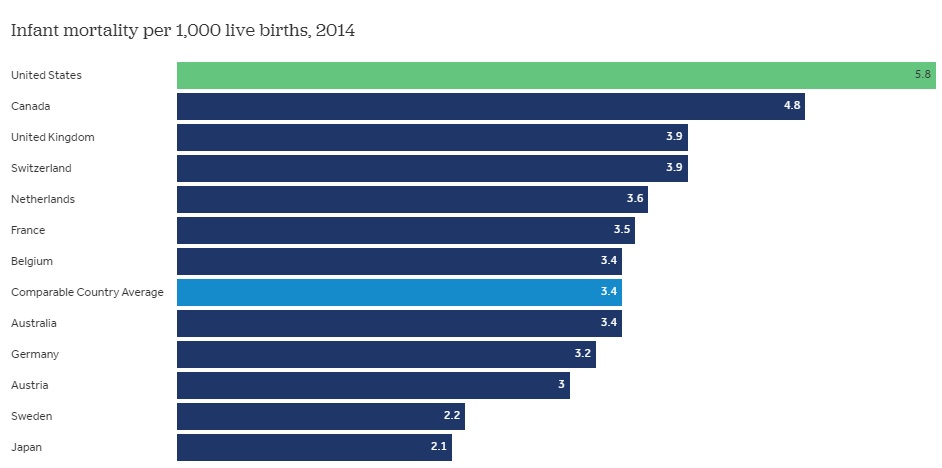
- Neonatology
- Pediatrics
- Neonatal Care
- Pediatric and Neonatal Nutrition
- Developmental Disorders
- Pediatric Infections
- Adolescent Problems
- Pediatric Cardiology
- Neonatal Respiratory Disorders
- Genetics and Pediatric Practice
- Neonatal Intensive Care Unit (NICU)
- Psychosocial Aspects of Pediatrics

